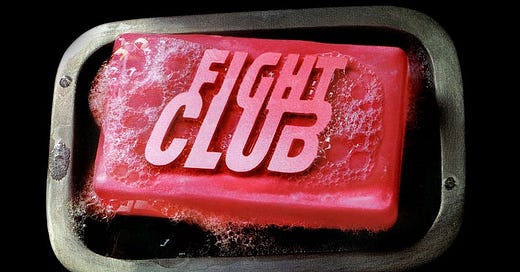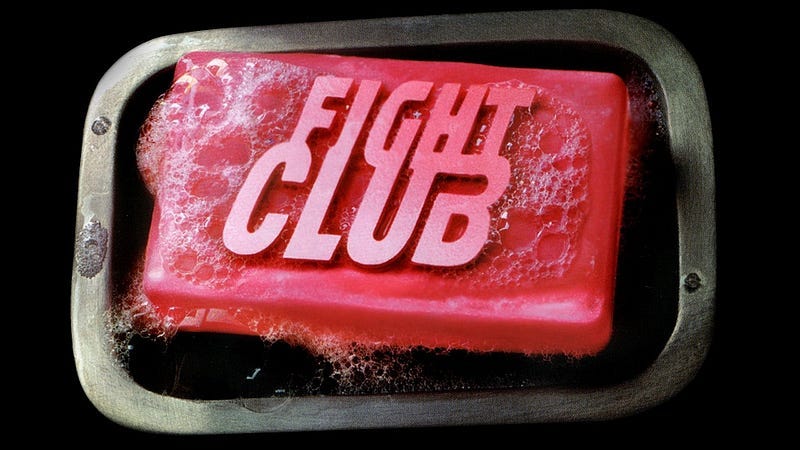Why The Soundtrack To ‘Fight Club’ Is One Of The Greatest Modern Film Soundtracks Of All Time & One…
The backdrop was the year 1999, with the world slowly experiencing the computer boom and the coming of the dot come era, and by and large…
The backdrop was the year 1999, with the world slowly experiencing the computer boom and the coming of the dot come era, and by and large music began to categorically change for the foreseeable future because of the emerging technology.
Radiohead released their alternative rock masterpiece ‘Ok Computer’, a couple of years earlier in 1997 — It was an album that had a lasting impact on people at the time and comprised of music that explored electronic elements and soundscapes with the underpinning theme of the technology boom and a reflection of society at the time. It’s fair to say that ‘Ok Computer’ ominously saw the future coming, where technology and our very experience of living life would change permanently.
In that setting, in 1999, the film ‘Fight Club’, an adaptation of Chuck Palahniuk’s novel, directed by David Fincher starring Brad Pitt, Helena Bonham Carter and Edward Norton, hit theaters across the world but rather surprisingly, it bombed at the box office.
However, in the years after its release, especially after it was made available on DVD, it soon gained a cult following and soaring popularity across the spectrum.
The film itself depicted unhinged aggression, violence, drugs, recovering addicts, sex, depression, strange sequences and characters and a script that was notoriously well written, which contrived to stamp Fincher’s idea of the existential crisis faced by a world overcome by consumerism and the lack of identity & expression and the underlying disillusionment faced by society during the late ‘90s.
What was perhaps even more staggering was the soundtrack envisioned by Fincher and brought to life by The Dust Brothers, which fit the movie and its very fabric like the perfect stitching to its cloth.
Of course the most famous song to be used in the film was The Pixies’— ‘Where Is My Mind?’ that plays in the last scene of the movie.
However, the soundtrack itself, composed by The Dust Brothers (John King & Mike Simpson) is an absolute masterpiece which was undeniably years ahead of its time and makes for an intriguing and immersive listening experience much akin to a concept album.
Breaking Down The Fight Club Soundtrack
The primary genre of the soundtrack is IDM, with heavy electronic sequencing and electronic drenched ambient elements, synths and filtered beats with tons of reverb along with odd motifs and occasional uses of random orchestral brass and percussion.
The synths, bass & ambient pads & heavy layers of electronic sampling along with captivating transitions & drum beats that continually evolve, explore the darker sketches and sequences of the film.
The whole soundtrack picks up where each sequence leaves off, but making sure it stays interesting enough as the subtle repetitions drift in and out of the entire score which fits the film like a charm.
It begins with ‘Who Is Tyler Durden?’, which starts off with interesting synths that draw you in and slowly drifts with turntable scratches, pauses, reversed beats and a sines and subs of ambient pads, bass and synths.
‘What Is Fight Club?’ emanates a heavy bass drone that is dark and moving & beats that progress and shift in and out of the bass motif. Put together they are contemplative and with grooves that fit the title perfectly, and enough interesting transitions and odd and eerie fx that echo the mood of the film.
‘Corporate World’ is a sarcastic take on modern society and is filled with odd humorous grooves and sequences to begin with, which reflect on the film’s rather dark humour & the tablas that kick in are also so very random along with risers that drift in and out of the track.
Tracks like ‘Medulla Oblongata’, & ‘Jack’s Smirking Revenge’ are perhaps my favourites which pick up from where the others leave off and entice and keep you hooked and engrossed.
The underlying beats, bass and grooves are cool and enveloping, along with sampled and filtered guitars & eerie bells & turntable scratches that move in and out of the core of both tracks which make both tracks absolute delights. Both those tracks are crafted to perfection.
The scene where ‘Jack’s Smirking Revenge’ plays in the movie when Pitt and Norton are sitting on the sidewalk drinking a couple of pints of beer, is so very astutely crafted and made, and complements the visuals in a strikingly perfect manner.
‘Stealing Fat’ and the scene where they actually steal fat from a liposuction clinic continues the odd humor of the film. ‘Commissioner Castration’ is beat and bass heavy track along with hints of sitars(I guess they’re sitars) and a slight bossa nova groove which make for another intriguing track nonetheless.
‘Marla’ and the downtempo groove coupled with the strange female sex noises in the background, make for a fitting theme when the female lead Marla played by Helena Bonham Carter is on screen & also further dovetail the movie’s underlying theme.
The culmination of the entire score, the track ‘This Is You Life’ sums up the movie and the entire soundtrack with the monologue by Brad Pitt running in the background with the most interesting points of view, like, “You are the all singing all dancing, crap of the world” and “You are not the contents of your wallet” and “You are not you f*ckin Khakis’ and of course the most famous line “This is your life and it’s ending one minute at a time.”
You can listen to the soundtrack here:
Closing Thoughts
The entire score was way ahead of its time in conception, execution and design. To reiterate, this was 1999, and music software was just springing up on PCs. So it’s safe to say that the Dust Brothers were exploring the new software and technology available at the time, and boy did they conjure up something brilliant.
The amalgamation of the score and the visuals, are uncannily like an astute confluence of music-to-cinematography and it’s hard to think of any other kind of music that would fit with the visuals as perfectly.
It’s a score that flows in the complete opposite direction of a usual orchestral score. Although you can categorize it as IDM, it’s evolving, dark and mixed with other genres and heavy electronic sampling and the motifs and elements which make for an undeniably compelling listen, both during the film and on its own.
Simply put, Fight Club would not have been the same movie with any other score other than this one.
And despite it not being nominated for an Oscar, it stands out by itself in the vast ocean of soundtracks and scores as perhaps the most experimental and innovative soundtracks to have ever been made in mainstream Hollywood.
Follow ‘The Music Magnet’ for more interesting music related content and if you’d like, you can buy me coffee and a couple of smokes below!







